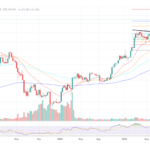
Key Points
- US and China now control 95% of the Bitcoin mining hash rate.
- This shift in power may lead to mass miner capitulation.
Bitcoin mining is undergoing a significant change, with 95% of the mining hash rate now controlled by two countries: the US and China. This power concentration could lead to mass miner capitulation.
Shift in Hashrate Distribution
The US now controls 40% of the Bitcoin mining hashrate, with China holding 55%. Previously, Chinese miners had the upper hand due to inexpensive hardware. However, the focus is now shifting to cost-effective energy sources. This change is largely due to China’s regulatory crackdown, which is causing mining operations to relocate to areas with more favorable energy conditions.
The US is narrowing the gap, controlling 40% of the hash pool. This shift is especially beneficial for US-based Bitcoin mining companies, particularly those catering to institutional investors. However, this mass exodus could present challenges for US miners as increased competition may thin profits.
Implications for Bitcoin Miners
Bitcoin miners have likely capitalized on profits while Bitcoin consolidated above $63K and peaked near $64K, as indicated by miner reserves hitting all-time lows. With Bitcoin mining difficulty reaching new monthly highs, seizing any opportunity for gains has become essential.
The influx of miners in the US raises concerns, as the increased competition is expected to drive difficulty to new records, ultimately reducing rewards. This could significantly threaten Bitcoin’s ability to reach the $68K resistance. On the other hand, this situation may underscore the dominance of large mining companies, giving them an advantage as smaller miners exit the market and further centralizing the network.
Large Bitcoin mining houses may seek to leverage their resources and take charge as many miners exit due to increasing difficulty. The largest Bitcoin mining company in the US, for example, has strategically amassed holdings. Their substantial holdings could also provide an advantage during miner capitulation, enabling them to absorb pressure when Bitcoin hits the market top. However, increased centralization could pose problems for the Bitcoin mining industry, preventing Bitcoin from breaking through the crucial $64K resistance.











